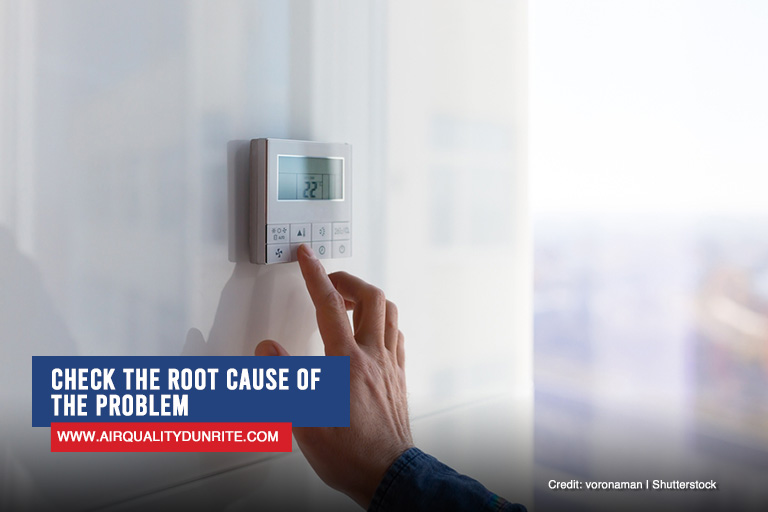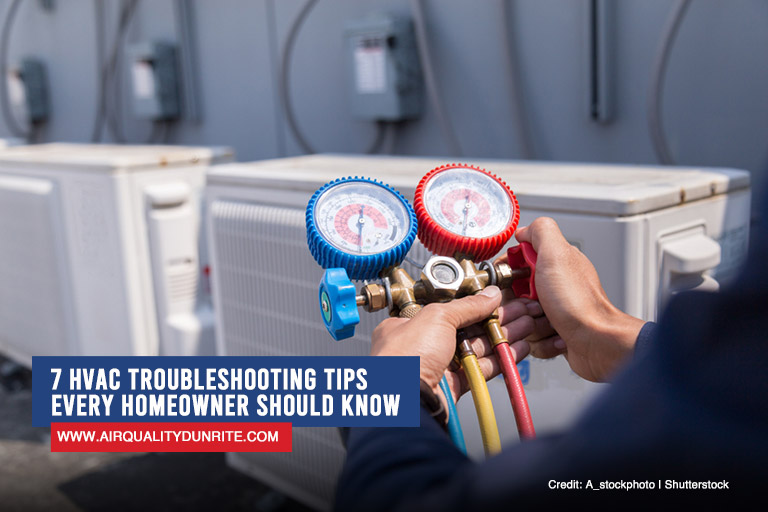Through the sweltering summers and chilling winters, your HVAC system works tirelessly all year round to ensure that you are comfortable in your house during the change of the seasons. However, all of this effort and exertion will take its toll on your unit, causing it to stop working or act in strange ways. Because a malfunctioning air conditioning system can cause you to become uncomfortable very quickly, it’s essential to know how to troubleshoot your HVAC unit.
Here are 7 HVAC troubleshooting tips every homeowner should know.
No Power

In some cases, it takes no more than a flip of a switch to get your HVAC up and running correctly again. If your furnace fan is not turning on or is dead, your circuit breaker may have tripped because of a power surge, or malfunctioning equipment, cutting off the power supply. In this case, you’ll simply have to reset the system. If the machine still fails to work, there could be an issue with the unit itself, such as a faulty motor or a blown-out fuse. These scenarios require a professional HVAC service.
Broken Thermostat
While thermostats are typically reliable, they may sometimes malfunction or require maintenance. Many HVAC issues occur due to a broken thermostat. If your system fails to start correctly or turn on, check the thermostat to see if it has power. A lot of thermostats are battery-powered and malfunction when the batteries run down. A change of batteries should be all that’s required to get them working properly again. However, those who find that a new set of batteries does not fix the problem may need to call HVAC companies to replace the thermostat.
Not Enough Airflow
Lack of sufficient airflow is another common problem that affects HVAC systems. This typically occurs when the filters are clogged with too much debris and dust, hindering airflow and preventing you from feeling either hot or cold air coming from the unit. To maintain your air filters, clean and replace them every 2 or 3 months. This will fix your airflow issues, improving the efficiency of your HVAC system and the air quality in your house. Also, make sure to check the outdoor AC unit of your HVAC system regularly. Clear the surrounding area of clutter, branches, fallen leaves, and other debris that may block airflow or obstruct the unit’s airways.
Short Cycling
Your HVAC might experience short cycling when its airflow is restricted, causing the unit to shut down before completing the respective heating and cooling cycles. Usually, you can resolve this issue easily by changing or cleaning the air filter. Additionally, short cycling can be the result of frozen coils. Thus check the evaporator coils for frost or ice and, if necessary, turn off the unit to let the coils thaw and call and HVAC professional to repair the issue
Bad Smells

You will require an air conditioner or furnace repair as soon as possible if you notice unpleasant smells coming from the appliance. This could be a sign of burnt wiring and mould, both of which are incredibly dangerous. Strange HVAC odors that are a sign of mould can often pose significant health risks. Check for leaks if you suspect that mould is growing in your air HVAC unit. If you find any, seal them off to prevent water from leaking into your house and creating moisture, which can lead to more mould. If the scent is coming from electrical connections and burnt wiring, contact an electrician to help you fix the problem right away and prevent any hazardous situations.
Loud Noises
If your air conditioner makes loud noises troubleshoot with the fan motor. This component blows hot air out of the house and cold air into the ductwork. Damaged fans may make a lot of noise that is hard to ignore. Even fans that are merely trapped with debris and dust may be noisier than normal. If the problem is the latter, clean your HVAC unit thoroughly to help reduce or get rid of the noise. However, it may be tough to figure out where the noises are coming from or what is causing them. Contact an HVAC specialist who can check and fix the unit to make sure that the unit is repaired correctly and more damage is prevented.
Not Turning Off
Suppose your air conditioner doesn’t turn off when the temperature set on the thermostat reaches room temperature. In that case, the issue typically has to do with the thermostat or the electrical system that runs the external condensing unit. Though you can shut off the unit using the air conditioner’s circuit, this is not a permanent solution because circuit breakers are not designed to be used like light switches. If the thermostat is blank or the air conditioner turns off when you switch the thermostat to HEAT, this is probably a sign of a broken thermostat that must be replaced. If the thermostat works with the furnace, there is perhaps another problem.If the unit shuts off, the thermostat is wired improperly or broken. If the air conditioner doesn’t turn off, you may need to clean the condensing unit or check to see if the contacts on the outdoor run relay are welded together and need to be replaced.
Are you looking for an air conditioner repair near Mississauga? How about a furnace repair near Mississauga? Search no further than Air Quality Dunrite. Contact us at (416) 674-8184 or visit our office at 30 Pennsylvania Ave #14 Concord, ON L4K 349 if you’re interested in our services.



